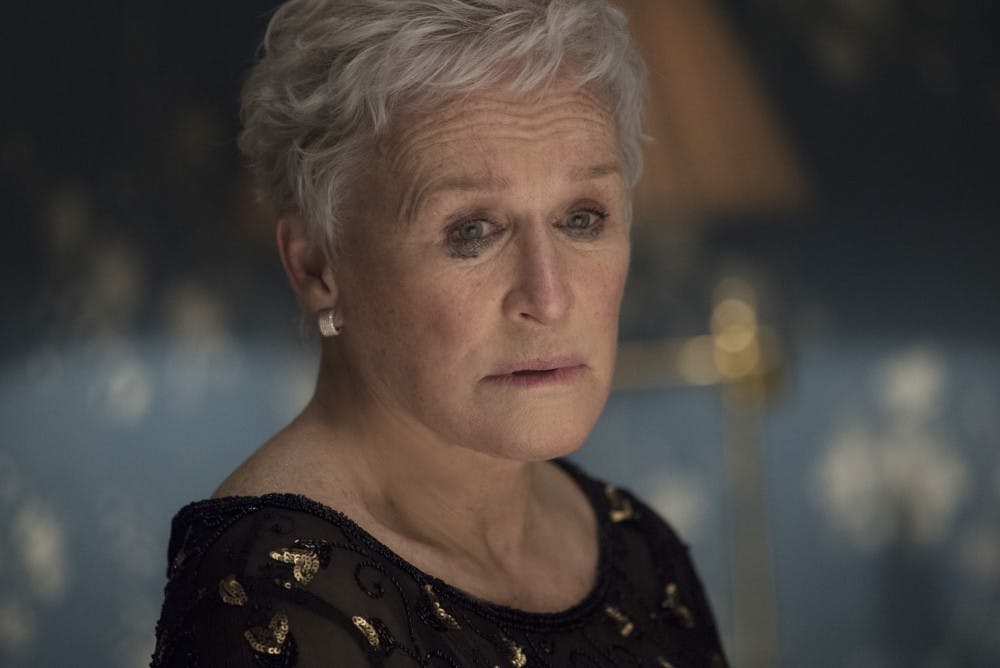Successfully translating literature for the screen rests in capturing the details of the written word without wearing out the audience. In the case of Swedish Director Björn Runge’s adaptation of the 2003 novel The Wife by Meg Wolitzer, the writer and the power of the word are at the epicenter of this simmering relationship drama. The ramifications of literary genius become the narrative thrust of the film, where the pacing is determined by the conditions of the characters’ inner lives. The result is a film that moves slowly, but deliberately, with every look, gesture, and word building to a blazing crescendo. Meticulous attention to detail is how The Wife makes a not particularly innovative but worthwhile story burn slowly into an intelligent reflection on the dynamics of image, recognition, gender, and talent in the life of a writer.
The Wife follows Joan (Glenn Close) and Joe Castleman (Jonathan Pryce) as they journey to Sweden to attend the Nobel Prize ceremony after Joe receives word that he has won the glittering title in literature. The news initially prompts the happy couple’s celebration of one of the greatest honors in any writer’s career, but as the film progresses, the cracks in the foundation of their seemingly harmonious existence become evident. This precisely calculated narrative unfolding is enhanced by Close’s subtle but affecting performance, which pierces through every flight of clever dialogue and quiet moment of reflection.
As Joan’s husband’s award ceremony approaches, she is unendingly reminded of what it means to be the wife of a so–called genius. The suffocating, patronizing world Joan finds herself in breaks her air of control and diplomacy with a pain that sits in waiting just below her composed surface. The Wife embodies the effectiveness of a slow burning narrative with a surprisingly satisfying payoff. It unfolds elegantly like a great novel, held together by performances that are at times quiet and others explosive. The film moves methodically through a trying time in the lives of Joan and Joe, exposing a dynamic between the two that manages to capture the layers of a forty–year marriage in a 100 minute runtime. The pacing of the film gives it a heightened realness, and every scene is filled to the brim with tactility and humanity.
This is the kind of film that deserves a second viewing for the acting alone. There is so much to be experienced when it comes to Close’s impeccable performance. Her ability to capture both the internal and external struggles of her character through the unassuming gestures of a mild–mannered woman is remarkable. Every movement, word, and subtle change of expression is a deliberate calculation with immense payoff. Although Joan is a generally shy and humble woman, through Close, she becomes a commanding presence. We need only keep our eyes fixated on her face to feel every bit of discomfort, drop of regret, and pang of agony that stirs inside her as she accompanies her husband through the exhausting swirl of names, faces, and congratulations in the lead up to his Nobel Prize recipient speech. Pryce delivers an excellent performance as Joe Castleman, the gregarious, fiery foil to Close’s reserved Joan. His role as the classic figure of perceived male genius features the combination of narcissism, unrelenting charm, impromptu oration, and infidelity, all of which are crucial in building the gender politics that drive the film.
The Wife’s success as a film is all in the details, for at the narrative level it doesn’t exactly reimagine the form the way that Joe Castleman’s novels do in the world of the movie. Ultimately, it is a richly–layered, brilliantly–acted reflection on the politics of gender, visibility, and recognizable genius. It succeeds in animating the stuffy world of erudite highbrows through the probing of a complex marriage, and takes its time in developing an elegant guide to reflection on our conception of the male genius.







